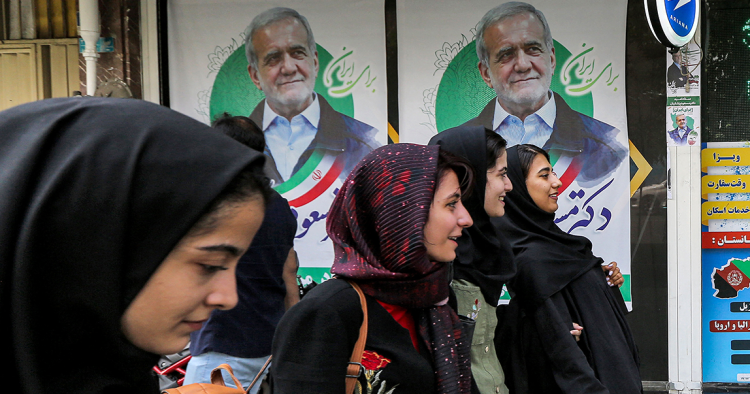The latest survey from Stasis Consulting estimates that voter turnout in the June 28 Iranian presidential election is likely to exceed 50%. Despite the sudden death of President Ebrahim Raisi, who perished in a helicopter crash at the end of May, Iranians do not believe his passing will cause any significant challenges for the country. According to the survey, Iranians view addressing youth concerns as a top priority for the next president, alongside dealing with the country’s long-standing economic challenges. In addition, there is widespread opposition to the way in which the government is dealing with the mandatory hijab, or veil, with more than two-thirds of respondents opposing the government’s imposition of strict penalties upon women who do not wear a hijab in public. A majority of Iranians dislike the Guidance Patrol (Gasht-e-Ershad in Farsi), the religious police tasked with enforcing the rules on compulsory hijab, and support making the wearing of the veil optional. These findings are based on a representative poll conducted by Stasis Consulting between June 12 and June 21, 2024, among 1,223 respondents aged 18 and older living in Iran.
Turnout in Iran’s 2024 presidential election expected to top 50%
Stasis Consulting predicts a higher voter turnout for the June 28 presidential vote than in previous elections, likely exceeding 50%. Its proprietary likely voter model predicts a 46% turnout as of June 21, seven days before the election. As of June 21, 9% of the electorate was still undecided, while 45% did not plan to participate. Stasis anticipates the proportion of undecided voters will decrease in the final days before the election and estimated voter turnout on election day should be over 50%.
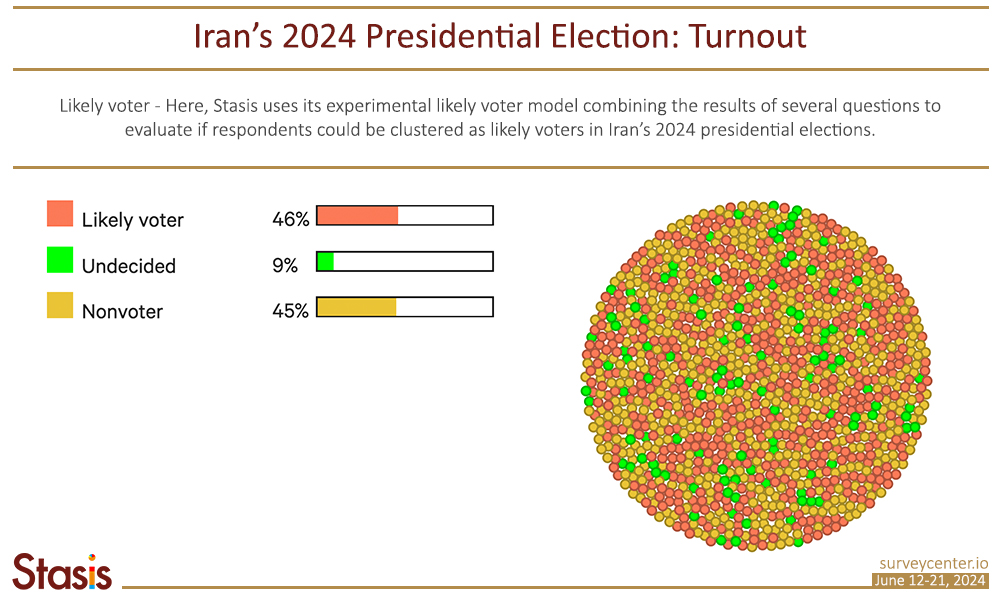
Awareness of the election date among Iranians is higher than it was for the previous parliamentary election. According to this survey, 51% of citizens know exactly when the presidential election will be held (June 28, 2024). This is a 23-percentage-point improvement in crucial civic awareness among Iranians over the last parliamentary election, held four months ago.
Moreover, most Iranians believe the presidential election will be competitive. Fifty-seven percent of respondents in this survey believe that the 2024 presidential election will be competitive, as opposed to 27% who have a different view.
Iranians have contradictory views of President Raisi’s performance
As expected, Iranians are conflicted about President Raisi’s job performance following his sudden death at the end of May. In every survey conducted by Stasis since President Raisi took office, Iranians have shown overall disapproval of his job performance. Just three months earlier, only 32% of Iranians expressed approval of Raisi’s performance as president. However, in this survey, 66% approve of his overall job performance, as opposed to only 26% who disapprove. (Click here for a visualization of how the Iranian president’s job approval has evolved over time.)
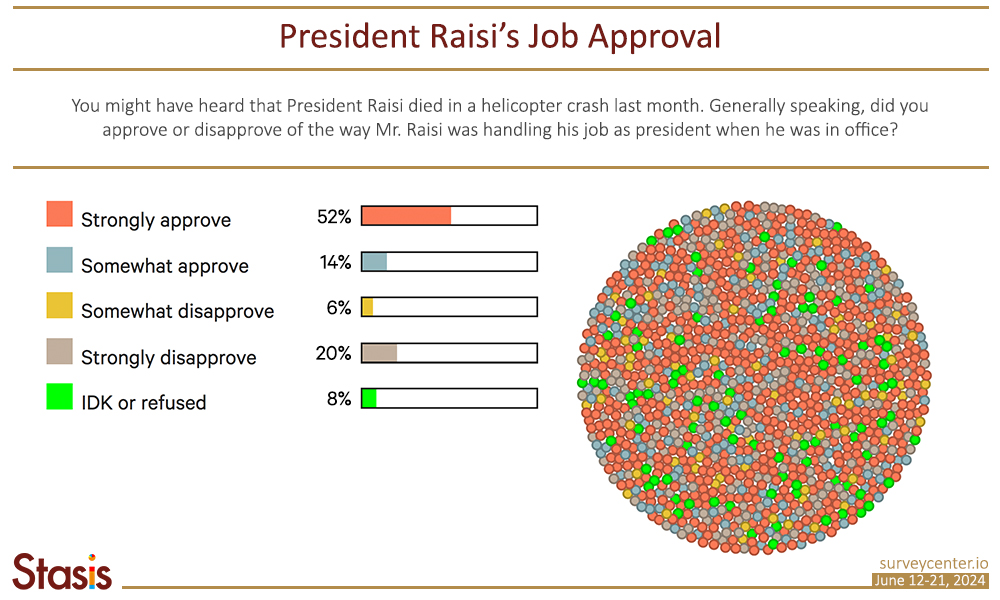
This survey further investigated President Raisi’s approval rating across different issues, such as the economy, youth concerns, foreign policy, dealing with corruption, and freedom or political liberties. Although Raisi’s overall job approval is high following his death, Iranians have more critical views of his performance on specific issues. Among the top five issues, Raisi only achieved majority approval for his handling of corruption. Fifty-six percent of respondents approve of Raisi’s approach to corruption, followed by foreign policy (43%), the economy in general (41%), youth issues (39%), and freedom or political liberties (33%). Moreover, 56% of respondents disapprove of his performance on the economy in general and 54% disapprove of his approach to youth issues.
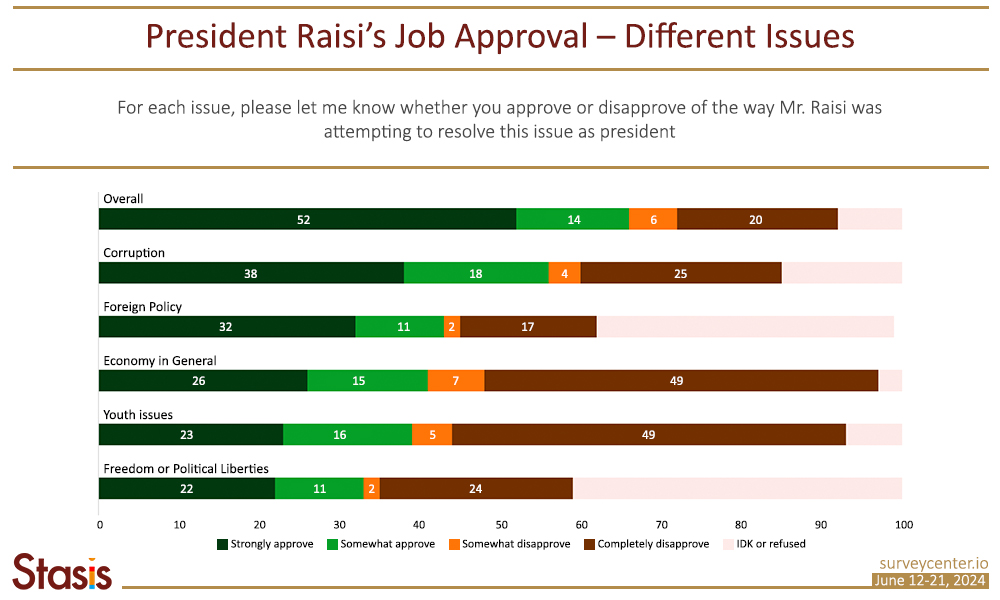
Iranians do not see Raisi’s death causing any challenges for the country. Just 14% of respondents say his death will cause challenges for Iran, as opposed to 62% who have a different view, including 55% who believe his death will cause very few or no challenges. Respondents with a college education (n=368) and those who live in urban areas (n=959) are more likely to say that the president’s death will not cause many or will cause no challenges, with 71% and 62% respectively.
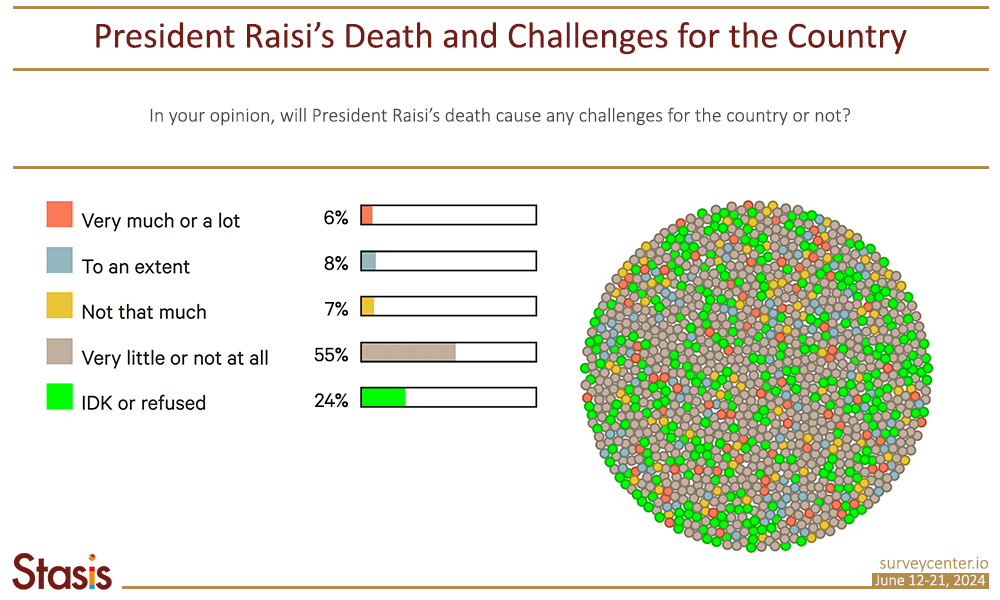
Apart from the economy, youth concerns top the list of priorities for a new president
Thirty-nine percent of Iranians named youth concerns as the “most important” issue that a new president should focus on when taking office. This is followed by unemployment at 32%, the cost of living and inflation at 23% each, and affordable housing at 18%.
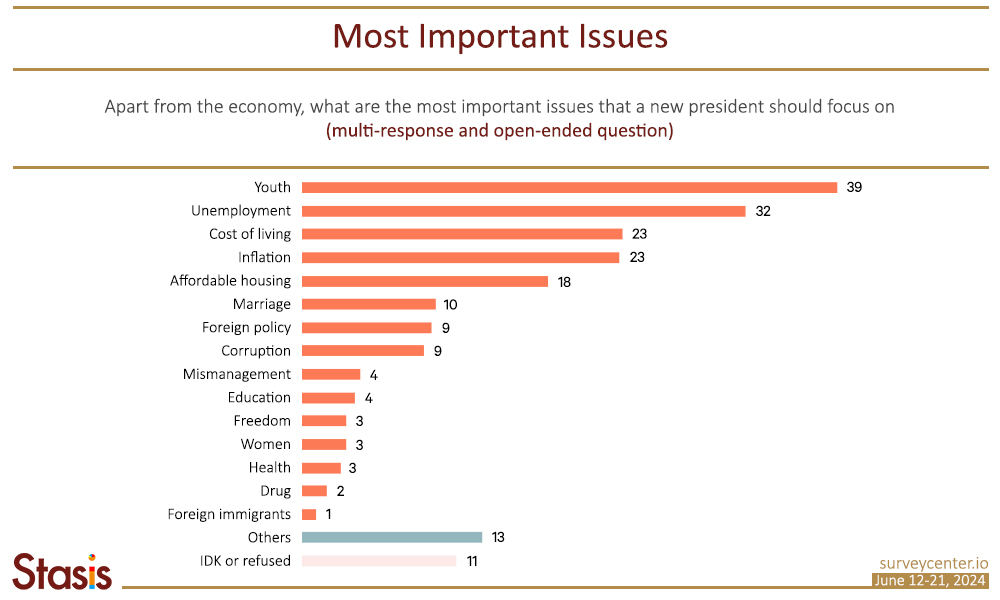
This was an open-ended question, and respondents were asked to consider issues beyond the economy. It was also a multi-response question, meaning they could name more than one issue, resulting in the sum of responses exceeding 100%.
Most Iranians oppose the government’s approach to women’s veiling practices
Iran’s government has tried to impose strict penalties, such as fines or imprisonment, upon women who do not follow compulsory hijab by refusing to wear a veil in public. Sixty-eight percent of Iranians say they oppose the government’s strict penalties for women who do not wear the hijab in public, including 61% who completely disagree. The level of disagreement with the government on this issue is consistent across age and gender. However, college-educated Iranians or those residing in urban areas are more likely to express their disagreement.
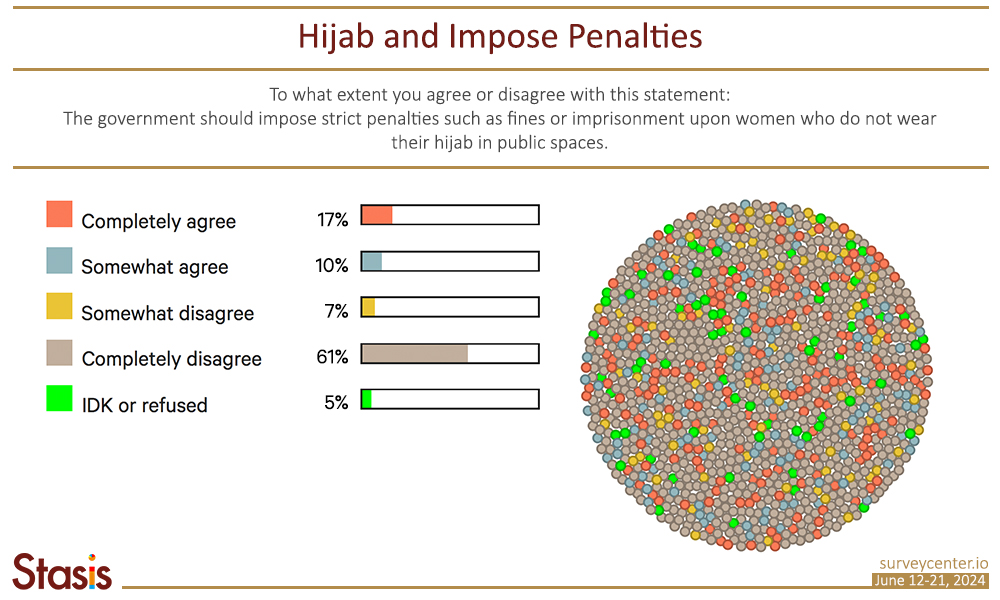
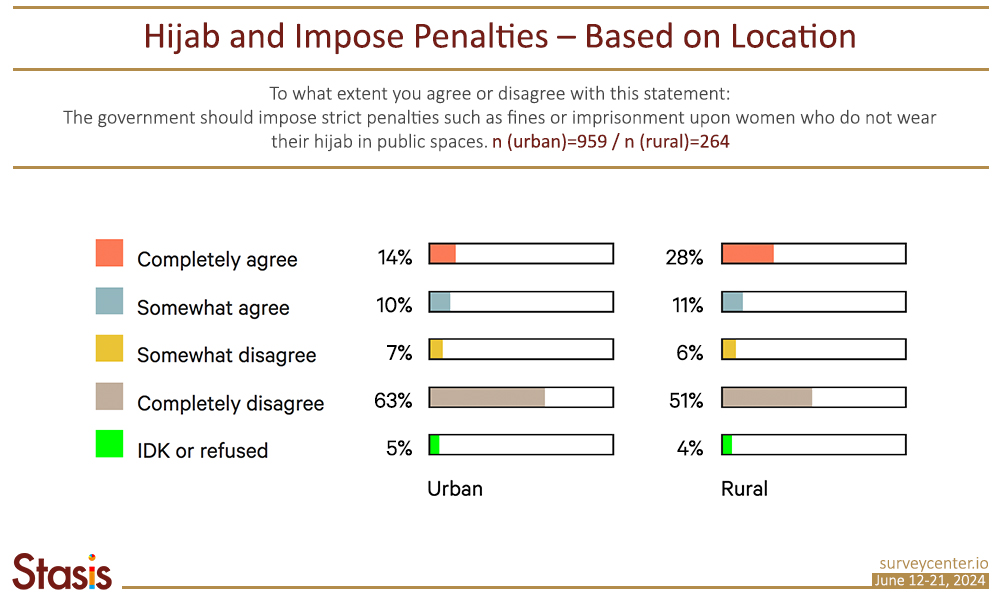
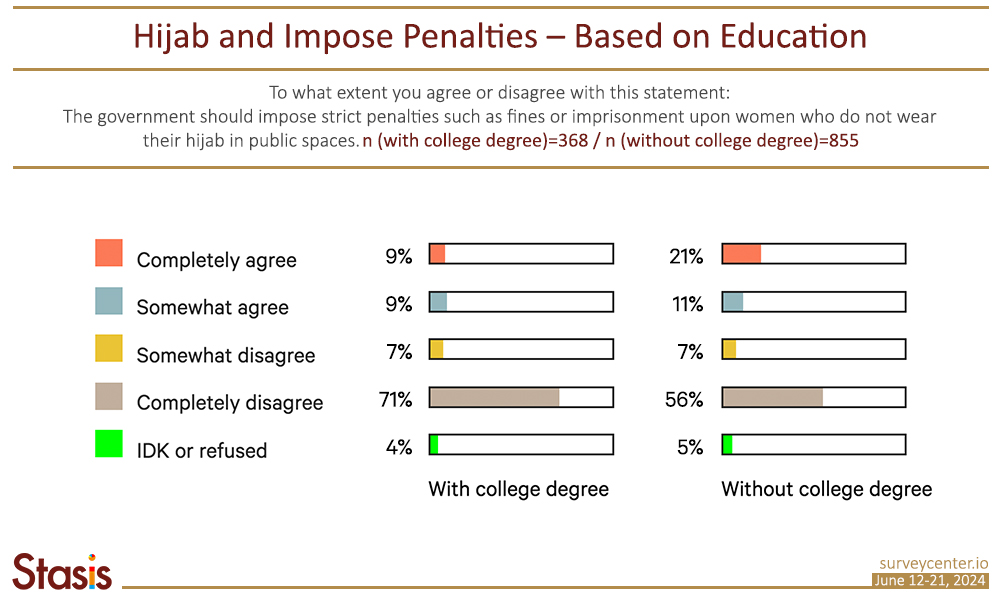
In addition, a majority of Iranians dislike the Guidance Patrol and prefer optional hijab. According to this survey, 55% of respondents say they are against the way the Guidance Patrol handles its job of dealing with women who do not comply with compulsory hijab, compared to 37% who agree with it.
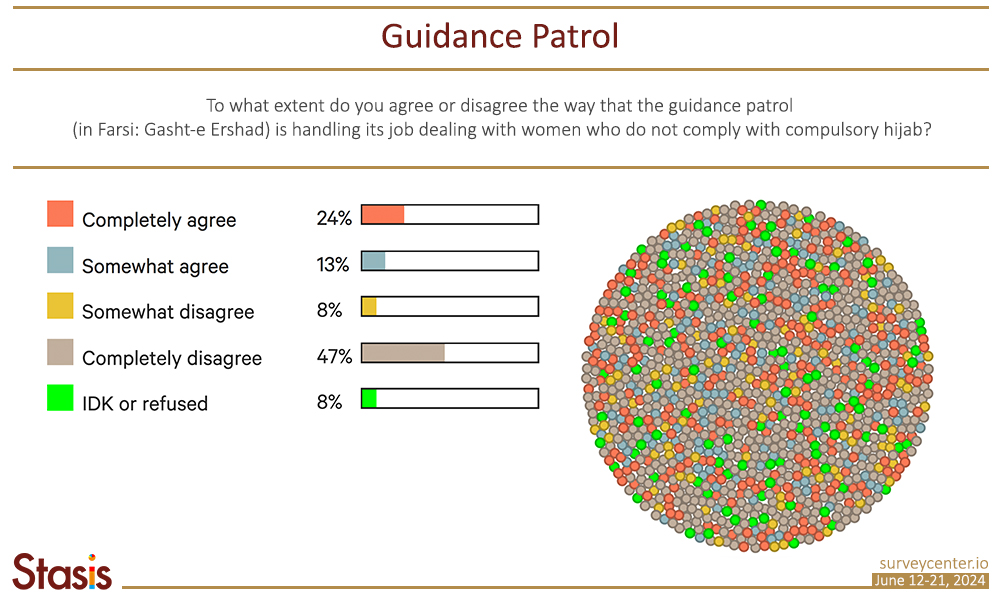
When asked whether they supported making hijab optional, 54% agree that it should be, compared to 43% who disagree. Educated Iranians or those residing in urban areas are more likely to express their agreement.
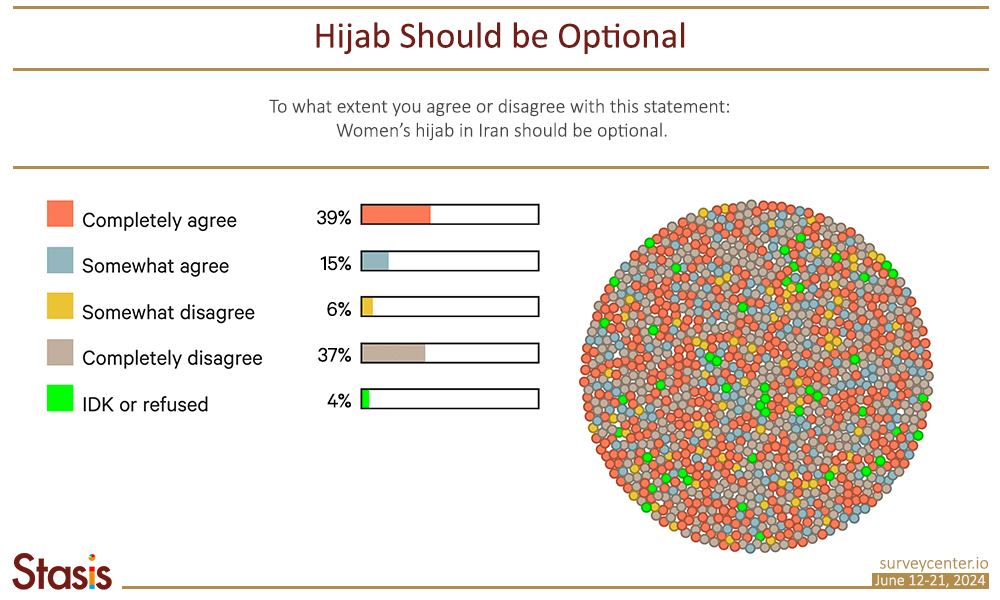
Iranians are in favor of the idea of a national referendum on key issues
Most Iranians are in favor of the idea of a national referendum, with 77% agreeing that in the case of important economic, political, social, and cultural issues, the people of Iran should have the power to call a national referendum to resolve differences. The level of strong majority agreement with the idea of a referendum is universal across different demographic groups. These results are comparable to the survey Stasis Consulting conducted in May 2021, in which 81% of respondents were in favor of a referendum.
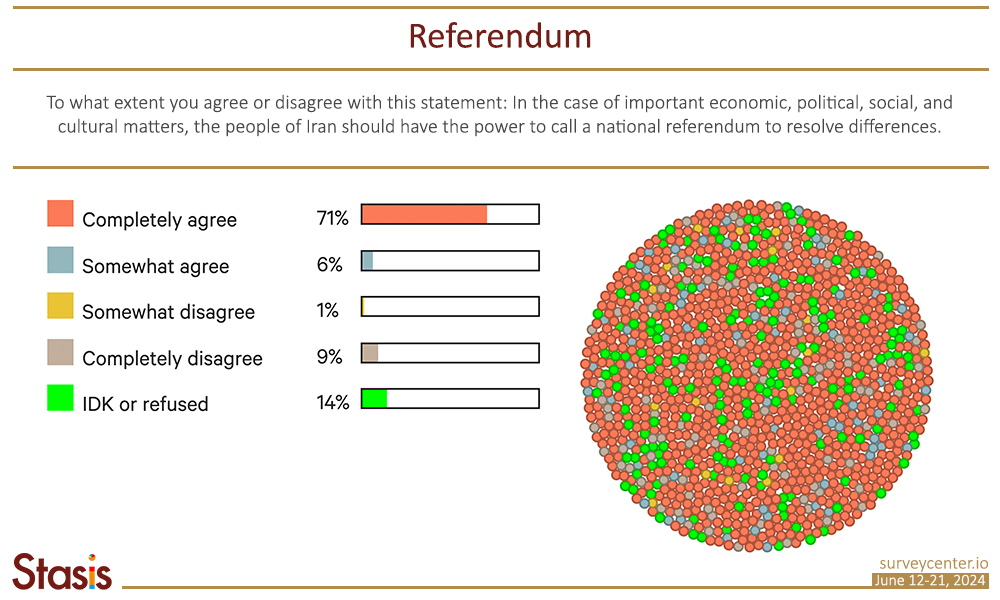
Drug usage is thought to be quite common among Iranian youth
The vast majority of Iranians (88%) believe that drug use is common among Iranian youth. Just 8% disagree.
Iranian citizens say they are overtaxed
Forty-seven percent of respondents believe Iranian citizens pay more taxes to the government than they should, as opposed to 37% who do not. The difference in responses to this statement is clearly correlated with the respondents’ level of education.
Iranians are nearly split on their support for the country’s two major political groups
Thirteen percent of Iranians lean toward the Reformist party, which is 2 percentage points less than those who prefer the Principlists. In the February 2024 survey carried out by Stasis Consulting, the share of each group was 10%.
Arash Ghafouri is the CEO of Stasis Consulting.
Methodology and notes
Telephone interviews were conducted by native Farsi speakers during local daytime hours between June 12 and June 21, 2024, among 1,223 respondents aged 18 and older living in Iran. The proportional two-stage sample includes respondents from every province. Provinces have been sampled based on their population. Results are weighted by gender, age, location (urban vs. rural areas), and adjusted for Tehran’s province. Based on the sample, there is a 95% confidence that the margin of sampling error is within ±2.8 percentage points. The response rate for this survey was 32.3%. For more information on the poll, please see this link.
Photo by RAHEB HOMAVANDI/AFP via Getty Images
The Middle East Institute (MEI) is an independent, non-partisan, non-for-profit, educational organization. It does not engage in advocacy and its scholars’ opinions are their own. MEI welcomes financial donations, but retains sole editorial control over its work and its publications reflect only the authors’ views. For a listing of MEI donors, please click here.













